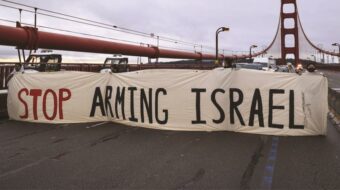
Movie Review
Love During Wartime
Directed by Gabriella Bier
2010, 92 mins., Unrated
Osama Zatar (“Assi”), a Palestinian from Ramallah, and Jasmin Avissar, an Israeli from Tel Aviv, meet at an animal shelter and feel a mutual attraction – he to her Western attitude of freedom, she to his intelligence, warmth and sensitivity. They marry in 2004, and inevitably their union releases a Pandora’s boxful of problems. A mixed marriage in that part of the world forfeits the elaborate support system other couples breathe, digest and absorb naturally. Indeed, it becomes legally impossible for Assi and Jasmin to live together in either country.
Their innocent dream to escape the bonds of politics, time and tribe ineluctably butts up against the sanctions of all-too-organized society at every turn.
Filmmaker Gabriella Bier worked from 2001 to 2004 with two other mixed couples, but both withdrew from the project for fear of dire social consequences, even death. Then she met Jasmin and Assi, and documented them for more than four years. They believed in the film and wanted their story to be experienced vicariously by a wider public.
Love During Wartime is not a political film on purpose. It’s about two relatively ordinary people. Folded between tension-inducing episodes with lawyers, courts, border checkpoints and immigration authorities, not to mention the doubts, concerns and even outright hostility from family and friends, Bier relieves the Kafkaesque saga with leisurely episodes of domesticity lit by a tender, transcendent love, albeit one that endures repeated strain and stress.
Gabriella Bier is a Swedish Jew with inbred Zionist sympathies whose preconceptions about Israel/Palestine necessarily changed as she learned more about the struggle there. Her work has focused on wrenching issues of nationalism, fundamentalism, and cultural conflict. She has tried to humanize a hot-button debate in which each side, at its extreme, rejects reconciliation in favor of a dangerously humiliating winner-take-all victory. This portrait of a marriage is a metaphor for the entire Holy Land struggle, where each partner is going to have to live with the other somehow, knowing that even a “two-state” solution will never be a complete divorce.
Forced to emigrate in order to live together, this story is an obvious echo, 70-odd years later, of the forced emigration of the European Jews, either to safety or, worse, to extermination. And it’s a deeper reverberation of the expulsion of the Jews (and Muslims) from Spain in 1492 – and of all the other involuntary population transfers throughout human history. Bier’s anarchistic sensibility defies the right of borders to define human beings and their relationships. John Lennon’s song “Imagine” comes to mind, while scenes of the couple abed recall the Annie Liebowitz stills of John with an almost motherly Yoko Ono.
Jasmin’s mother was born and raised in Germany, which allowed Jasmin to claim residency there, though not necessarily work or citizenship rights once it became known that her husband was Palestinian. Bier reports no difficulties filming in either Israel or Palestine, but she did find the German authorities prickly. “This made me suspicious that they may have something to hide,” she says. When Assi first joins her in Germany, Yasmin points out some examples of the Stolperstein project, little memorial stones commemorating the people who once lived in this house or that apartment block, and were either forced to emigrate or killed. While anti-Jewish behavior in modern Germany is studiously monitored, active anti-Muslim attitudes are commonplace. There’s some implication that for all the humanitarian programs European countries fund in the Palestinian NGO sector, they seem to resist “importing” any actual Palestinians.
Where will this couple end up? The suspense builds with one disappointing turn after another. All we’ll say is that the dénouement feels good but is surely atypical: Not everyone is a sought-after artist, nor gets to Europe by parental birthright or can afford pricey lawyers. Nothing has changed on the ground except eventually, perhaps, from the eye-opening effect of this film. Well, almost nothing: What irony that Europe, which had such a strong hand in the establishment of Israel, is now is the destination for those fleeing Israel-Palestine. The brain drain has gone into reverse.
“Being in your own documentary, hanging out with the people you film, it is like being in the film!” Bier has said. A viewer of this cinema verité documentary inevitably asks how much intervention or re-enactment actually took place, but it’s a healthy conversation, because one way or another we are all in this film together.
Love During Wartime opens in New York at the Tribeca Film Festival on April 20.













Comments